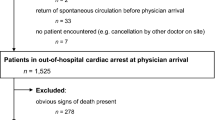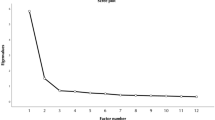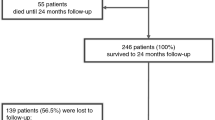Abstract
An anonymous postal survey was conducted among the physicians collaborating in a randomized controlled trial to examine their method of convincing patients, their consent process, the factors related to higher accrual, and the predictors of 100% success in the process of obtaining informed consent (IC). A total of 512 questionnaires were sent out and 448 responses were received, for a response rate of 87.5%. The 448 physicians solicited a total of 5,371 eligible patients (12.0 per physician), among which 3,763 patients (8.4 per physician) agreed to participate. One-fifth (22.3%) of the physicians were able to obtain IC from 100% of the patients they solicited. Physicians who thought that the information on the IC sheet was sufficient to obtain consent (odds ratio [OR]=2.0, 95% confidence interval [CI]=1.1–3.9; p=0.03) and those who did not consider that the patient's decision was influenced by relatives and friends (OR=0.2, CI=0.1–0.4; p=0.001), were significantly more likely to obtain IC from 100% of the eligible patients. Three-fourths (73.2%) of the physicians targeted only patients who they perceived would easily provide IC, and 81.2% favored some form of incentives for patients. The results of this study should be useful for efficiently implementing randomized controlled trials in Japan.
Similar content being viewed by others
Article PDF
References
Verheggen FW, van Wijmen FC : Myth and reality of informed consent in clinical trials. Med Law 1997; 16: 53–69.
Lavori PW, Sugarman J, Hays MT, Feussner JR : Improving informed consent in clinical trials: a duty to experiment. Control Clin Trials 1999; 20: 187–193.
Lavelle-Jones C, Byrne DJ, Rice P, Cuschieri A : Factors affecting quality of informed consent. BMJ 1993; 306: 885–890.
Fukui T, Rahman M, Hayashi K, et al: Candesartan Antihypertensive Survival Evaluation in Japan (CASE-J) trial of cardiovascular events in high-risk hypertensive patients. Rationale, design and methods. Hypertens Res 2003; 26: 979–990.
STATA Corporation : STATA Statistical Software Version 7.0 (Intercooled). College Station, STATA Corporation.
Rahman M, Morita S, Fukui T, Sakamoto J : Physicians' choice in using internet and fax for patient recruitment and follow up in a randomized controlled trial. Methods Inform Med 2004; 43: 288–292.
Rahman M, Morita S, Fukui T, Sakamoto J : Physicians' attitude towards and reasons for participation in the Candesartan Antihypertensive Survival Evaluation in Japan (CASE-J) trial. J Epidemiol 2005; 15: 38–40.
Feld AD : Informed consent: not just for procedures anymore. Am J Gastroenterol 2004; 99: 977–980.
Anonymous : Survey on physicians, dentists, and pharmacist. J Health Welfare Stat 2002; 9: 472 ( in Japanese).
Anonymous : Health care manpower. J Health Welfare Stat 2002; 9: 170–183 ( in Japanese).
Author information
Authors and Affiliations
Corresponding author
Rights and permissions
About this article
Cite this article
Fukui, T., Rahman, M., Morita, S. et al. Informed Consent in the Candesartan Antihypertensive Survival Evaluation in Japan (CASE-J) Trial: A Survey of Collaborating Physicians. Hypertens Res 29, 471–474 (2006). https://doi.org/10.1291/hypres.29.471
Received:
Accepted:
Issue date:
DOI: https://doi.org/10.1291/hypres.29.471



